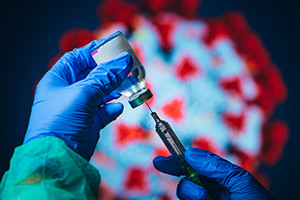Covid Vaccine
 As the COVID-19 pandemic evolves, so does the information. Last week we sent information about the anticipated vaccine and it’s availability. This week we are answering some of your most frequently asked questions:
As the COVID-19 pandemic evolves, so does the information. Last week we sent information about the anticipated vaccine and it’s availability. This week we are answering some of your most frequently asked questions:
We will continue to keep you informed and aware of any changes as they come. If you have specific questions or concerns:
Reach Out to Us
- High Risk Groups
- Effects on Treatment
- Will I get it at NCS?
- Protection?
- Effectiveness
- Safety
- Social Distancing
It has been reported that the vaccines will be distributed first to high-risk groups. Do cancer patients and survivors fall into that group?
Cancer patients do. Probably anyone with cancer is at higher risk than the general population for suffering severe consequences from a COVID-19 infection, regardless of the type of treatment they are undergoing. That’s also the case for people with a lot of other preexisting conditions — high blood pressure, heart disease, diabetes — and people in nursing homes and other settings where the consequences of getting COVID-19 are particularly bad. For cancer survivors, it’s less clear.
Will the vaccine have negative effects on my cancer treatment?
It’s unlikely to affect your cancer treatment, but very little is known right now about the interactions of the vaccine with cancer therapy or with cancer patients. Your cancer treatments would probably have a negative effect on the vaccine, because the vaccine works with your immune system, and most cancer treatments suppress your immune response. It may be that the vaccine won’t work very well in people who are in active treatment. But even if the cancer treatment decreases the effectiveness of the vaccine by as much as 50%, it’s still worth getting, because if you have at least 50% protection, that is a good thing.
Will NCS patients get the vaccine at NCS?
We are following Food & Drug Administration (FDA), Centers for Disease Control and Prevention and Nebraska State Department of Health guidelines on who can be vaccinated safely, and when. We will send our patients information about how to receive the vaccine as soon as it becomes available
How long will the vaccine protect me? Will I need a booster shot later?
Nobody knows how long the protection will last. The pharmaceutical companies’ analysis shows the vaccines are effective after two months, but will that protection last six months, a year,10 years? Nobody knows yet, because nobody has been vaccinated that long. Both the Moderna vaccine and the Pfizer vaccine are two-shot vaccinations. You’ll get the vaccine and then you’ll get a booster later.
If it turns out that immune protection lasts only two months, is it even worth it for anybody get it?
Even if it’s effective for only two months, there are groups of people who would benefit from that — first responders, people working in the emergency room, people working in the COVID sections of hospitals, because they’re at high risk of infection.
Should I worry about the safety of the vaccine?
The number of patients who have been vaccinated with both the Pfizer vaccine and the Moderna vaccine is in the tens of thousands, so we have a pretty good idea regarding safety — and the initial data from these clinical trials suggest the vaccines are safe. Safety will be very closely scrutinized by the regulatory agencies and panels that will be approving the vaccine for use. When hundreds of thousands of people have been vaccinated in these clinical trials, we’ll have an even better idea of what the safety signature looks like for the vast majority of people.
Once I get vaccinated, can I stop wearing a mask and social distancing?
Until the virus is gone, you should not. We don’t know what’s going to happen. And what if half the population doesn’t want to get vaccinated? We cannot let our guard down. The safest thing to do is to get vaccinated and continue our current safety measures until we get the pandemic under control.
© 2023 Nebraska Cancer Specialists • Privacy Policy • design by Chip Thompson
Meet DOT.

